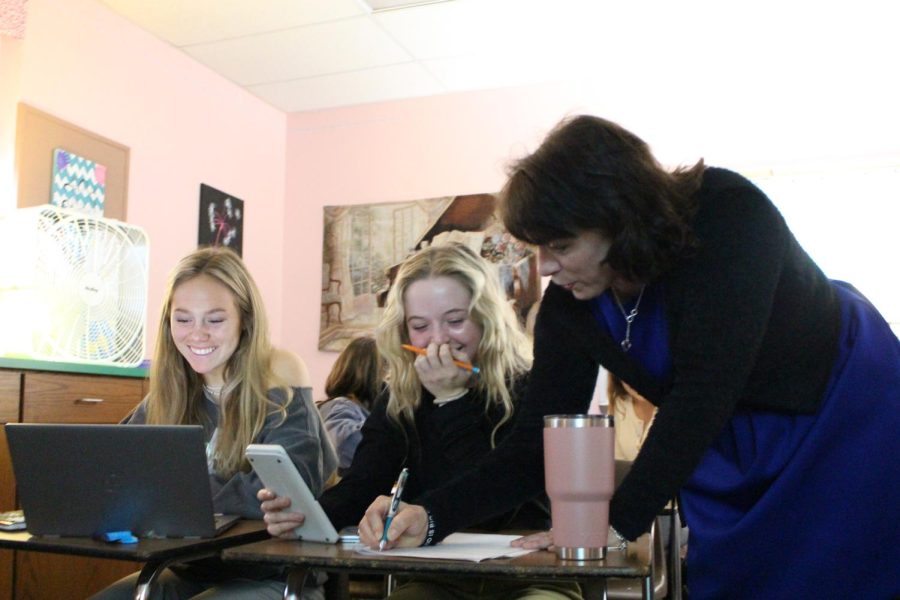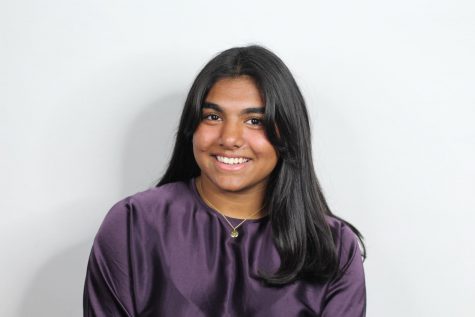Teacher Feature – Coughlin takes on Carroll
Honors Statistics and Honors Calculus teacher reflects on her teaching journey, from Germany to the senior high school
February 9, 2023
After a brief hiatus, Teacher Features are back. This time, Honors Statistics and Honors Calculus teacher Mrs. Kelly Coughlin reflects on her teaching journey, from Germany to the Senior High School.
Q: Just to start off, what do you teach here?
A: So, this is my fourteenth year here. I’ve taught several math classes. Right now, I teach Honors Calculus and Honors Statistics.
Q: How did you start teaching math?
A: I’ve always loved math. I’m a math and science nerd, so I’ve taught math and science. I’ve taught chemistry, physics, biology and math. What really made me think teaching math was a great idea was my teacher in ninth grade, I asked her, “Why do you teach math?” She told me she didn’t have to write any papers and I was like “Wow.” That’s because that was back when we had to type on a typewriter and if you made one mistake you had to start completely over. But, I do love math so I’m happy with math or science.
Q: Did you always know that you wanted to be a teacher?
A: From before I went to school, I wanted to be a teacher. And then, in every grade, I would love school so much that I would be like “I want to teach that!” In first grade, I would say that, and then in second grade, I would say “No, I want I want to teach that!” I think it’s because I’ve always loved to learn. Learning has always been my favorite thing.
Q: You said that you’ve taught science and math, can you take me through your teaching journey?
A: Well, my first teaching job was for the Department of Defense Dependents Schools. So, I left college and moved to Germany where I taught American soldiers’ children. Then I came back to the United States and started teaching. I taught at a school that wasn’t a good fit for me because there was a lot of gang activity, so I left teaching for a while. I went into the aerospace industry. I worked at Lockheed Martin, but I really missed teaching, so we moved to Maine where I went back to teaching. Which is, like, I’ve always loved teaching. I like kids, I think y’all are fun. I think y’all are interesting. I mean, every block, I get 30 new people who are super interesting and kids, to me, are just so fun. You guys are so happy. I don’t know, kids are so filled with potential and my favorite thing to do is to find a student who’s kind of down on math, because not every student loves math and I know that. I love to take a student who thinks math is to hard for them and to let them know that they can do it. I live for kids saying, “I can do this” and “I’m going to take these math classes in college that I didn’t think I’d be able to do before.” And then, it’s very exciting to me when kids email me who are in college and they say that they’re going to minor or major in math or that they’re taking this advanced math now and they’re good at it. I love getting these kids and taking the fear out of math for them.
Q: That’s really wonderful, it sounds like teaching really calls out to you.
A: It does, it really does.
Q: It also sounds like you’ve had a really interesting teaching career.
A: I did, I got a little off-topic, didn’t I? Germany was really fun, but when I got back to the states, I was really not equipped to deal with the school that I was at. I had kids literally tell me, “Why do I have to do my homework, I’m not going to live to be 18 anyway.” I was young, and I just didn’t know what to do with this. So, I left for a while, and then I came back and taught ever since and I love it. In Maine, I started off in math, but science had an opening and I was recruited for that. Then, I came here. I started in Colleyville, I was there for four years, but I lived here in Southlake so one of my friends who taught here told me about a job and my kids went to school here so I started teaching here in 2009.
Q: How do you think teaching, and I’ll just focus on Germany, how do you think teaching in Germany to those soldiers’ children compares to teaching here in Southlake?
A: Kids are stressed out everywhere. Kids in Southlake have a high stress because you’re such high achievers. You want the best ACT score, you want the best SAT score, you want all these AP classes you’re very stressed out because you’re such high achievers. Soldiers’ kids, they were stressed out because they didn’t know where their parents were. They could be on a secret mission, they didn’t know if their parents were coming back so it’s a whole different kind of stressed. Now, you had zero discipline problems, which we don’t have them here either, but there, it’s a very military environment so the kids are used to doing what they need to do. I think the big difference is the types of stress that they’re under those kids are under some scary stress cuz their parents are deployed, like they might be there with one parent and their mother or father might be deployed, and they didn’t have cell phones in the 90s so they couldn’t talk to their parents and it was very high stress with parents being deployed.
Q: What’s something that you have learned from that teaching there that you’ve applied to teaching afterwards?
A: The sense of community that you feel. Because you, and all of your friends that you make, and everyone you teach, and that you’re teaching with are very far away from their home and their family. You don’t get to go home for Christmas, you don’t get to see your family, and all of your kids are kind of in that boat. They’ve got their mom and dad, but all their aunts and uncles, grandparents, everybody is far away in the United States so you’re all there, alone together, and you build a really nice sense of community and you really care about the people you work with and I think of that parallels here in Southlake where we have such a strong community.
Q: You also mentioned for a little bit that you left teaching. What do you value about that time?
A: I ended up working for Lockheed Martin, so I got to work in the science environment. I was a buyer of raw materials and exotic metals so that part of it was really fun and interesting, you know, learning about different types of steel and all these new things to me, and to go out on the line where they’re building where you can watch the coordinate plane and see the numerically controlled machines that are programmed by the engineers. You could watch the display of XYZ coordinates and you can see all this change, so I could see all this math out there and it was like a teacher’s dream. Of course, you can’t bring a bunch of kids out there, but it was really fun and I liked knowing I was doing something that helped our country. I really liked that part and every night when I would leave the airplanes would be taking off from the base. Because I had just come from a military community and both my brothers are retired military, I felt like I was doing something good for the country because I was helping get parts there and get stuff ready for the jets that we need to defend our country. So, it felt good to be working for the country, but I missed the kids. I belong in a school environment. I live in an August-to-July year, I don’t live in January-to-December and I missed the whole thing. I loved the seasons of school, you know, coming back and then we’ve got the fall, we’ve got homecoming with all this fun stuff. It’s always fun, you know what I mean, there’s always exciting things going on and I missed all that.
Q: You’ve obviously been able to see the applications of math in the real world, but how do you help students who just take math for the sake of taking it? How do you help them apply it?
A: Well, in Statistics, I have the the opportunity to teach using Google Sheets and spreadsheets, so a lot of times my students in Statistics can really see the applications because they know we’re doing spreadsheets and they see their parents do spreadsheets and we can bring in topics that they want. We don’t have to do a preset problem, they can pick anything they want. In Calculus, it’s harder but we structure Calc so that we give kids the skills in the fall, and the spring is all application. So, in the spring every unit will be a real life application, like if we do particle motion, then we look at physics. We do a business calculus unit so they would see what they would use realistically because a lot of kids are future business majors, they want to go into Finance. Sometimes, it is hard to show kids where the real world applications are because the honest truth is if you’re going to be a journalist, you’re not going to use calculus. But, what I can compare it to is like a workout for the brain, because when you’re doing math, you’re building pathways and logical thinking skills, and no matter what job you go into, being a problem solver is going to get you ahead. It is true some kids aren’t ever going to use calculus again, I can’t lie and say that they will, but we can use the skills. In Statistics, well, everybody’s going to use some of that somewhere in their life, even it’s doing your household budget, so we bring the real life stuff in Statistics and that’s easy to do with the kids because they can pick anything they’re interested in. Like, in the spring when we learn the normal distribution, they’re going to look at their ACT scores and they’re going to get a z-score. They’re going to know exactly how good they are and that’s always really fun to me because we’re here in this competitive environment and you might not think your score is good and when you compare it to the United States, it’s actually very good. That’s a great feeling.
Q: Well, first of all, thank you so much. Also, before we end, is there anything else about teaching, teacher life, or in general that you want to add?
A: That, no matter where you go, no matter what you do, no matter what your job is, you have – and I was talking to kids about this today – one life. You’ve got to make it a happy one. You have to do what makes you happy and it has to be your happiness, not somebody else’s happiness. Follow your dreams. I followed mine, I’m living my dream and I think all the kids should too. I think here, I really worry about the stress levels that kids put on themselves. You want a perfect SAT, ACT, you want 500 AP hours or whatever, you want top everything, and I think sometimes our kids forget to give themselves a break and take time to just have some fun and be happy.



